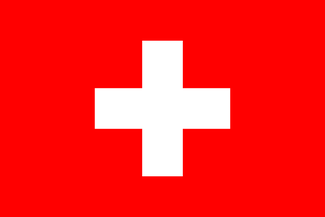| 瑞士 | |
|---|---|
 | |
| 政府类型 | Democracy |
| 执政党 | Katholisch Konservative (conservative) |
| 首都 | Bern |
| 人口 | 490.34 thousand |
| 主体民族 | Swiss |
| 被接受民族 | |
| 识字率 | 70 % |
| 国家价值观 | Order |
| 科研学派 | Traditional academia |
| 地位 | Civilized |
Switzerland in Victoria II pretty much matches its contemporary borders. From the fall of Napoleon in 1815 up to the present day, it remained at peace and maintained neutrality amid the web of international alliances (with the exception of the civil Sonderbund War of November 1847 between seven Catholic cantons and the federal government, whose foremost general presided over the First Geneva Convention). But what would have happened if it were aggressive and expansionist?
Overview
Switzerland begins in 1836 as a Civilized Nation, but achieving Secondary Power status and engaging in colonization is not difficult after building up industrialization, research capacity, and prestige. Even Great Power status is achievable in the long term. It is sandwiched between ![]() France,
France, ![]() Austria,
Austria, ![]() Sardinia-Piedmont (
Sardinia-Piedmont (![]() Italy), and
Italy), and ![]() Baden (
Baden (![]() South German Federation/
South German Federation/![]() Germany).
Germany).
Advantages and disadvantages
Switzerland's strengths lie in its high literacy and research areas of Commerce tech and Industry, although its small population and low immigration rate provide challenges in boosting industrialization score. Cultural research, although neither favored nor penalized, can result in great leaps in prestige, which may provide a more rewarding focus than Industrial tech. Military score typically rises the slowest, since Army and Navy research are penalized given Switzerland's small population, its traditional focus on neutrality instead of aggression, and its lack of ocean ports. That said, even slow Army advances result in good bonuses toward defensive posture in this mountainous country, and large invasions can be stymied by Swiss mountaintop defenses and high rates of enemy attrition.
One should note that Prussia has a core on Neuchâtel until Switzerland takes the decision The Republic of Neuchâtel. They are usually not aggressive for it, but just in case, it might be a good idea to research Romanticism as soon as possible to take the decision.
Diplomacy
France and Austria, and even ![]() Prussia to an extent, have quite a lot of influence over Switzerland and the Swiss will likely end up in one of those spheres. Any one of them is a powerful ally.
Prussia to an extent, have quite a lot of influence over Switzerland and the Swiss will likely end up in one of those spheres. Any one of them is a powerful ally.
![]() Sardinia-Piedmont will probably become a rival early in the game. Annexing its lands can give access to the sea, which can lead on to the North African nations and other exotic parts of the world. Given that Sardinia's capital state is in the region that would connect Switzerland to the sea, however, annexing this land would require all other Sardinian regional provinces to have been acquired first. For coveted sea access, it may be more realistic in the long run to ally with France, declare war on Austria, allow France to attack weaker Austria while Swiss troops defend the homeland, and then acquire the provinces of Lombardia and Venezia. Or you may build the Panama Canal or Suez Canal to gain ports for colonizing Africa and the Pacific later in the game.
Sardinia-Piedmont will probably become a rival early in the game. Annexing its lands can give access to the sea, which can lead on to the North African nations and other exotic parts of the world. Given that Sardinia's capital state is in the region that would connect Switzerland to the sea, however, annexing this land would require all other Sardinian regional provinces to have been acquired first. For coveted sea access, it may be more realistic in the long run to ally with France, declare war on Austria, allow France to attack weaker Austria while Swiss troops defend the homeland, and then acquire the provinces of Lombardia and Venezia. Or you may build the Panama Canal or Suez Canal to gain ports for colonizing Africa and the Pacific later in the game.
Hidden strength
A special feature of Switzerland is its "Swiss" culture - every pop in Switzerland is Swiss (rather than South German, French or North Italian) and the culture does not appear in any other nation at the start of the game. As a result, fast assimilation is a useful target after conquests.
Events
The Geneva Convention is a uniquely Swiss decision, that enables another decision for all Civilized nations; Sign the Geneva Convention. It gives a 0.01 infamy pr. month in exchange of 5% army organisation regain rate and 0.02 reduced war exhaustion pr. month. On top of that it gives Switzerland 10 prestige.
